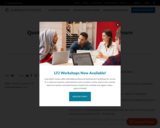
This accompanies the lesson Conflict Resolution and Peace.
- Subject:
- English Language Arts
- Material Type:
- Lesson
- Provider:
- Southern Poverty Law Center
- Provider Set:
- Learning for Justice
- Date Added:
- 08/24/2017

This accompanies the lesson Conflict Resolution and Peace.
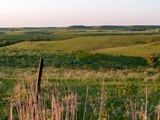
Rangelands are one of Nebraska’s most important and valuable natural resources: forage for livestock, habitat for wildlife, protection to soil from erosion, filters runoff water, and recharges groundwater. This unit will prepare students with a better understanding of rangeland ecosystems to prepare them for better management decision making. Unit by Kortni Burnett, Nebraska Agriculture, Food, and Natural Resources Educator
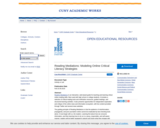
Reading Mediations is an interactive, web-based guide for teaching and learning critical online reading skills. Best used with high school or college students, it includes a selection of critical reading tools and verification resources, guided readings, and structured learning activities. It also presents opportunities for independent exploration and critique of the online news and information ecosystem, with live content provided through Twitter and several news websites.
The guiding principle of Reading Mediations is that the epidemic of misinformation, propaganda, and poor journalism online cannot be eradicated by fact-checking tools alone. It must begin with us, the readers. Learning first about how we consume information, and then learning how to do so in a savvy, responsible, and self-aware manner, readers will be better equipped to absorb and share what they engage with online as critical thinkers. Published on the Scalar platform, Reading Mediations takes advantage of the networked environment in which we read, both to model best practices and to provide users with direct experience. The guide's readings are organized in a semi-structured but non-linear way––not only because this is how we tend to read online, but also because reading in a networked manner can help us navigate and evaluate the surfeit of information available.
Access Reading Mediations: here: http://readingmediations.memoriamundi.org/education/reading-mediations/index
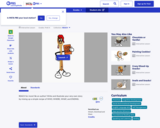
Be an author! Write and illustrate your very own story by mixing up a simple recipe of WHO, WHERE, WHAT, and ENDING.
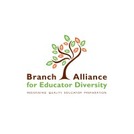
This is the recording of the third BranchED OER Webinar: Designing OEr for Social Emotional Learning. Link to recording here.
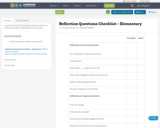
A general checklist that prompts students to reflect on their learning after completing work on a project.
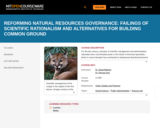
For the last century, precepts of scientific management and administrative rationality have concentrated power in the hands of technical specialists, which in recent decades has contributed to widespread disenfranchisement and discontent among stakeholders in natural resources cases. In this seminar we examine the limitations of scientific management as a model both for governance and for gathering and using information, and describe alternative methods for informing and organizing decision-making processes. We feature cases involving large carnivores in the West (mountain lions and grizzly bears), Northeast coastal fisheries, and adaptive management of the Colorado River. There will be nightly readings and a short written assignment.

For the last century, precepts of scientific management and administrative rationality have concentrated power in the hands of technical specialists, which in recent decades has contributed to widespread disenfranchisement and discontent among stakeholders in natural resources cases. In this seminar we examine the limitations of scientific management as a model both for governance and for gathering and using information, and describe alternative methods for informing and organizing decision-making processes. We feature cases involving large carnivores in the West (mountain lions and grizzly bears), Northeast coastal fisheries, and adaptive management of the Colorado River. There will be nightly readings and a short written assignment.
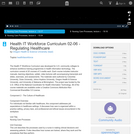
This unit describes the processes used by a nurse in making clinical decisions and assessing patients. It also describes how nurses are trained, where they work and the procedures that they perform.
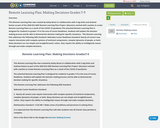
This Remote Learning Plan was created by Kathy Brzon in collaboration with Craig Hicks and Andrew Easton as part of the 2020 ESU-NDE Remote Learning Plan Project. Educators worked with coaches to create Remote Learning Plans as a result of the COVID-19 pandemic.The attached Remote Learning Plan is designed for students in grades 7-9 in the area of Career Readiness. Students will explain the decision making process and be able to demonstrate decision making for specific situations. This Remote Learning Plan addresses the following NDE Standard: Nebraska Career Readiness Standard: Nearly all careers now require interaction with complex systems of technical components, complex dynamics of people, or both. Many decisions are not simple and straightforward; rather, they require the ability to intelligently reason through and make complex decisions.

Seminar participants and invited guests will lead critical discussions of current literature and ongoing research. Each student will be responsible for identifying, reviewing, and presenting one structured discussion of articles from the current literature that are relevant to their research topic. The remaining time will be spent working on individual projects or thesis proposals. This fall, the seminar will focus on the following core issues that underlie most implementations of urban information systems and decision support tools: the sustainable acquisition and representation of urban knowledge; the emergent technological infrastructure for supporting metropolitan decision-making; and the innovative organizational and institutional arrangements that can take advantage of modern urban information systems.
ArcGIS/ArcMap/ArcInfo Graphical User Interface is the intellectual property of ESRI and is used herein with permission. Copyright © ESRI. All rights reserved.
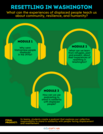
Students begin this unit by exploring the themes of humanity and community as they discuss the many factors that influence the development of personal identities. They unpack together how we show versus hide different parts of ourselves, and how our identities can be both fixed and ever-changing. Then, students listen to oral histories by Vietnamese Americans in Washington to learn how displacement and resettlement have impacted them personally and shaped their outlook on helping others. Using evidence from these firsthand accounts, students answer the question: What can the experiences of displaced people teach us about community, resilience, and humanity? Throughout this unit, students work in teams to create a podcast where they reflect on their collective responsibility to stand in solidarity with displaced people.
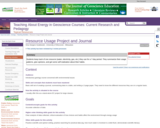
This project is an opportunity for students to realize the impacts of their lifestyles on the environment. They choose one of the following options to keep track of:
A. Energy consumption (transportation, industrial, or residential hot water),
B. water consumption
C. food consumption
D.Waste production
Then the student records the appropriate personal information from that category for a seven day continuous period. Their submission of 2-3 pages must include their raw data, a summary of their raw data, and a conclusion of what they have learned from the project. Honesty and creativity in presentation are encouraged strongly, even if the data reflects a "non-green" lifestyle. Students are graded equally on length, grammar, relevancy, voice, and content.
(Note: this resource was added to OER Commons as part of a batch upload of over 2,200 records. If you notice an issue with the quality of the metadata, please let us know by using the 'report' button and we will flag it for consideration.)
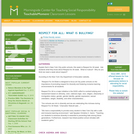
In this lesson students explore ways to be allies to those being teased, harassed or bullied in their schools.

In this 5th grade library lesson, students examine three images about year-round school and identify their initial emotional responses using a Likert scale, developed by Jennifer LaGarde and Darren Hudgins. They are then given the opportunity to read more about each image and discuss how that changes their response. In part 3, they write a paragraph about how the addition of information changes their emotional responses and whether or not they would share the image and why.Shared by the LPBrown Elementary Media Literacy Teacher Team:Brandi Appelgate, teacher-librarianCarolyn Balderston, instructional coachErin Bernier, 1st grade teacher Nina Woodhouse, 2nd grade teacherTony Perez, 5th grade teacherSean Shaughnessy, principal
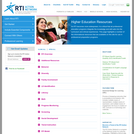
As RTI becomes more widespread, it is critical that all professional education programs integrate the knowledge and skill sets into the curriculum and clinical experiences. This page highlights a number of the informational resources that are available on this site for use in professional preparation programs.
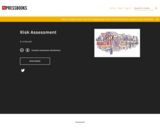
Risk analysis, assessment, and management is essential to any engineering field. This course is designed to provide students with an understanding of how to perform a comprehensive risk assessment applicable to a wide variety of engineering problems. The course will focus on failure mode and effect analysis, fault tree analysis, probabilistic risk analysis, and human reliability analysis. The course will also cover fundamental probability and statistics content.

This book is intended for the Risk Management and Insurance course where Risk Management is emphasized.
When we think of large risks, we often think in terms of natural hazards such as hurricanes, earthquakes or tornados. Perhaps man-made disasters come to mind such as the terrorist attacks in the U.S. on September 11, 2001. Typically we have overlooked financial crises, such as the credit crisis of 2008. However, these types of man-made disasters have the potential to devastate the global marketplace. Losses in multiple trillions of dollars and in much human suffering and insecurity are already being totaled, and the global financial markets are collapsing as never before seen.
We can attribute the 2008 collapse to financially risky behavior of a magnitude never before experienced. The 2008 U.S. credit markets were a financial house of cards. A basic lack of risk management (and regulators' inattention or inability to control these overt failures) lay at the heart of the global credit crisis. This crisis started with lack of improperly underwritten mortgages and excessive debt. Companies depend on loans and lines of credit to conduct their routine business. If such credit lines dry up, production slows down and brings the global economy to the brink of deep recession—or even depression. The snowballing effect of this failure to manage the risk associated with providing mortgage loans to unqualified home buyers have been profound, indeed. When the mortgages failed because of greater risk- taking on the Street, the entire house of cards collapsed. Probably no other risk-related event has had, and will continue to have, as profound an impact world wide as this risk management failure.
How was risk in this situation so badly managed? What could firms and individuals have done to protect themselves? How can government measure such risks (beforehand) to regulate and control them? These and other questions come to mind when we contemplate the consequences of this risk management fiasco.
Standard risk management practice would have identified sub-prime mortgages and their bundling into mortgage-backed-securities as high risk. People would have avoided these investments or would have put enough money into reserve to be able to withstand defaults. This did not happen. Accordingly, this book may represent one of the most critical topics of study that the student of the 21st century could ever undertake.
Risk management will be a major focal point of business and societal decision—making in the 21st century. A separate focused field of study, it draws on core knowledge bases from law, engineering, finance, economics, medicine, psychology, accounting, mathematics, statistics and other fields to create a holistic decision-making framework that is sustainable and value- enhancing. This is the subject of this book.
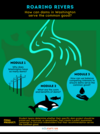
This unit begins with a challenge in which students must make a decision for the common good. The task highlights the importance of considering various stakeholder perspectives in order to serve the common good. Students transfer what they have learned to their study of a major dam project in Washington State. Teams focus on one of four projects (Upper Skagit Hydroelectric Project, Lower Snake River Project, Columbia River Gorge Project, Columbia River Basin Project). Each team works together to understand the perspectives of diverse stakeholders as they develop a response to the unit-driving question: How can dams in Washington serve the common good? Teams apply what they have learned to come up with a recommendation for the future of the dam project that considers how it will impact people and places.

This course examines joint fact-finding within the context of adaptive and ecosystem-based management. Challenges and obstacles to collaborative approaches for deciding environmental and natural resource policy and the institutional changes within federal agencies necessary to utilize joint fact-finding as a means to link science and societal decisions are discussed and reviewed with scientists and managers. Senior-level federal policymakers also participate in these discussions.